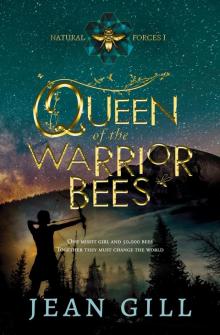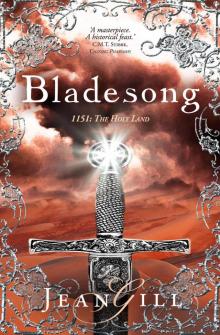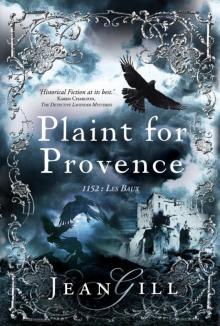Bladesong Read online
Page 5
‘Like all women, she is useful, if she is obedient,’ Yalda’s father acknowledged. ‘And the knight is drained by such dallying.’
‘If his Estela is so important to him, she would be useful to us...’
Bar Philipos’ lip curled in contempt. ‘Surely no man could be so weak! I have more faith in the poppy than in the girl but the more we bind him, the easier it will be to let him loose and reel him in should we choose - or let him spin into the black of his own despair and ending, should we choose.’
‘I hope you haven’t forgotten our common interest.’
‘Damascus.’ Bar Philipos bowed his head. ‘We bait our hooks with the book and the knight, bind our allies to us though they hate each other, and where trade profits, we profit.’
‘As long as you remember that. We must work together or lose all. I need to go to Jerusalem. I don’t dare send any messenger and she will be anxious for news.’
Bar Philipos didn’t need to ask who ‘she’ was. ‘Tell her she shall have a book that makes her priceless psalter look like a common charter.’
‘And you will tell your master that he shall have a book that makes the Koran of Damascus’ Umayad Mosque look like a camel-drover’s purse.’
‘We understand each other. The book must not go to those dung-beetles, the Jews, who are never satisfied with the quarters they are given, or the trade they are allowed. Whatever they get, they want more. If only their curse was not on the book!’
‘Superstitious nonsense.’ Bar Philipos flinched at this bald dismissal of the words binding the book, and the other man continued, ‘Your master can rest easy as, with the knight’s assent, we shall not be stealing. In fact, now I think of it, we shall earn the blessing on those who preserve the book!’
Bar Philipos did not join in the laughter and his farewell was subdued. ‘I wish you safe journey, de Rançon. My support goes with you to your lady for as long as her support meets the needs of my city.’
‘Quite. And your master need know nothing of me.’ The two men parted.
Treading barefoot back to his private chambers, Bar Philipos chided himself for feeling dirty. The young Frank always had that effect on him and yet the dark knight locked in his stifling chamber aroused no such reaction. Rather he felt stimulated by the way Dragonetz thought. What had he said? Expedience makes strange bed-fellows.
Expedience had brought him and the Frank together and neither suffered any illusions about their strange partnership. The Frank had so much to learn about the Levant, newcomer as he was, and perhaps he would make the right choices of his own accord, the more he understood what was at stake. As the legitimate bearer of the book, Dragonetz could make choices but ignorance of the Kaballah would not protect either of them from its power.
Should Bar Philipos obey that power and approach the Jews to whom the book truly belonged? He whispered to himself, ‘Blessed be he who preserves it and cursed be he who steals it, and cursed be he who sells it, and cursed be he who pawns it. It may not be sold and it may not be defiled.’ He shivered as he knelt in front of the cross, and prayed to Jesus.
Chapter 4
Every time the wet-nurse Prima brought Musca to his mother, his perfect, miniscule fingers curled deeper into her heart and every time he was carried away from her, he took part of her clenched in his tiny fists.
Estela had seen motherhood. She had visited the cottages with her mother, seen love and hope creating magic and miracle, seen despair over death, and the worse despair, over unwanted life. She’d administered the herbs to soothe after-fevers and melancholy, or the holy thistle if the mother’s milk wouldn’t come. Estela’s own herbal lore had grown from the knowledge Malik had passed on, but she had no need to add his recommendation of fenugreek to holy thistle, for Prima. No problems there for the wet-nurse, whose generous body doubled its output with ease to feed Musca along with her own son, Simo, a week older than his foster-brother. What would it be like to suckle a baby? Estela wondered, her own breasts newly unbound and no longer aching.
When Musca’s face screwed up with hunger screams, the nurse held her arms out for him and would have left the chamber to feed him but Estela stopped her. ‘There is nothing that you need hide from me,’ she told Prima, who protested at this breach of custom but gave in, settling on a stool, closing her eyes peacefully as the grasping hands and mouth latched onto their one goal. From agonised screams to total contentment in three seconds, such was babyhood. There was a kind of peace in the simplicity of it. Food, sleep, wiping up mess. Again. And again.
Yes, Estela had seen motherhood. But nothing could have prepared her for how she, Roxane de Montbrun, felt as a mother. Even the word seemed full of strange flavours as she turned it on her tongue, to savour it. The word ‘husband’ had slipped down her throat, tasteless as stale water, but ‘my son’ jerked a string in her deepest core.
Estela pushed the reluctant Prima to talk to her and what began as an interrogation became shyly two-way. The nurse’s name had come from an unimaginative peasant father, who still farmed Dia lands, with the five sons who had luckily followed his disappointing firstborn. Her own man had died in the summer sickness, leaving her with a baby on the way and a place at her father’s hearth. Even though she had a baby, sometimes it was useful to have the extra protection of her father and brothers. Prima flushed and looked away as she spoke.
For the first time, Estela noticed the young woman as a man might. Her honey-brown hair escaped in curls from under a demure cap and the curves of her body, enhanced by childbearing and the glow of happy motherhood, were equally rebellious under the constraints of dun homespun. Her manner, too, attracted. Comfortable with who she was and how she was, Prima knew how to behave in keeping with her rank. Unlike Estela, who continued to ask unsuitable questions.
‘How did you meet Raoulf?’
Prima blushed once more, fetchingly. Raoulf had chosen her midwife well, Estela thought cynically, her suspicions heightened.
There was a hint of a stammer in the response. ‘He was collecting dues for my Lord of Dia and I was helping my father with the tally.’
‘I see.’ Whatever pleasure Raoulf might have in mind with the farmer’s daughter, he would see she was better off from his attentions, Estela was sure of that. And a soldier far from home was never likely to worry too much about his wife. Or children. Her heart squeezed in that new way it had acquired. She shrugged it off. Raoulf was not the sort of man to worry too much about his wife even if she were at his side. And Dragonetz? What would he be like as a husband? Another train of thought to cut short. Had her fancy been so unruly before the baby? Pff. All that mattered was that Raoulf had chosen a good wet-nurse.
Frowning, Estela demanded abruptly. ‘How old are you?’ hiding her surprise at the answer, ‘Seventeen.’ So they were of an age but Prima had been weathered by farm-work outdoors and chores indoors, her skin brown and her hands calloused.
In her turn, Prima asked Estela hesitant questions about her family, most of which were smoothly evaded. No outright lies were required as the key question never arose. And if anyone ever did ask Estela ‘Who is the baby’s father?’ she had all her answers prepared, depending of course on who did the asking. As the women grew to know each other, Estela made a decision.
‘I want you to bring Simo with you,’ she told Prima, whose mouth made a frozen ‘O’ in shock. ‘We’re sharing one baby,’ Estela pointed out, ‘so I don’t see why we can’t share two. That way, you can spend more time here, I can spend more time with Musca, and with Simo too. Why not?’
Unable to pit, ‘It’s not done’, against the force of Estela’s will, Prima accepted the new arrangement and whatever the Chateau of Dia thought of the new craziness of its latest troubadour, ‘artistic temperament’ was held responsible.
No-one was foolish enough to speak to Estela of convention and respectable behaviour, although the young Comtessa-to-be did speak of new songs. ‘New songs?’ Estela repeated in a dazed voice, hearing tambours an
d cymbals, lute and rebec, over the imagined sound of a baby wailing. Impatient brown eyes fixed hers across the gulf of maternity.
‘You’ve talked about nothing but the baby for two months now,’ snapped Bèatriz, ‘and it’s boring! I can’t believe you’re turning out just like the other women. I really don’t care whether your offspring slept for an hour or a month, or whether his dribble alchemised into pure gold! He’s just a baby. And I’m stuck on the repeated end-rhyme of a canso! I need you to help me finish it.’
‘Two months,’ Estela repeated. Had she been living in baby-world for two months? She smiled, feeling cow-like dreamy happy. ‘End-rhymes ... canso...’ Her brain stood to attention. ‘Sing it to me.’
‘At last!’ Bèatriz breathed a sigh of relief and launched straight into the passage that was tormenting her. Eyes shut, Estela teased apart the words and the melody, feeling for the wrong sound, finding the right syllable, the right note, the way Dragonetz had taught her. ‘Play on ‘ion’,’ she told Bèatriz. ‘You could use ‘jazion’, ‘volon’, ‘desiron’, and try dropping, not rising. More passion, less jollity. Languish a bit.’
‘Thank you!’ Bèatriz rushed off to experiment alone, leaving Estela humming a melody that had come to her, which she was still singing hours later when she cradled Musca in her arms. He smiled his gummy smile and she sang his future to him, a life of daring and damsels. Like his father’s. Estela was back to work.
It was on just such an afternoon of babies and melodies that the visitor came. Nici was dozing in a corner, one eye flicking open occasionally to check on his people. Since Musca’s birth, he too had changed. From the moment he risked approaching the new-born that mewled on Estela’s lap, sniffed its sicky-milky smell, he had grown fully into the role for which he had been born. The role for which generations of selective breeding had prepared him, however scatter-brained he had been when sent to do his job with the flocks on the hillside.
Or so Estela saw the change in him, as she watched the great white dog and he watched her baby. Nici roamed less, spent little time with the packs of curs scavenging round the chateau environs, alert in a second when Musca whimpered. The appearance of a second baby seemed to have merely confirmed his belief that here was work worthy of a good dog. On this particular day, he was peacefully stretched out on the stone flags.
Prima was feeding Musca while Estela tested out a trill on Simo, skipping a dance step round the chamber and shooting him in the air for the high notes. ‘He’s too young!’ protested Prima but Simo remained defiantly contented while the world whirled round him. ‘You’re turning him against his mother,’ muttered Prima half-heartedly.
‘Turn, turn,’ sang Estela, suiting action to words. Simo gurgled, wriggled and waved his arms, blinking in the bright light that came in when the great oak door swung open, seconds after Nici had transformed into the Beast of Gévaudan. He’d leaped impossibly from semi-sleep to full alertness, glancing once at Musca on Prima’s lap, then placing himself between Estela, Simo and the door. Hackles raised, teeth bared, legs braced to jump, Nici’s low growl prickled the small hairs on the back of Estela’s neck.
‘My lady,’ squeaked a page, and was interrupted by the figure behind him, whom Estela had not recognised with the sun back-lighting him to silhouette. Evidently, Nici did recognise him, and that was enough to warn Estela.
‘I’ll introduce myself,’ interrupted a voice with the warm accent of Estela’s southern home. But there was no warmth in this voice. Instinctively, Estela pulled the baby close to her and Prima covered up the suckling Musca in a layer of shawl. The growling dog waited, tense.
‘No, Nici,’ Estela told him, but she didn’t add, ‘It’s a friend’. The dog stayed where he was, waiting, fixing the visitor with unwavering brown eyes.
‘So you even stole one of father’s dogs when you ran!’ sneered the man. ‘Ever the thief, and too stupid to know how useless this one is - though it seems you found out. You should both be called ‘Nici’.’
Thinking rapidly, Estela told Prima, ‘Take the baby and leave us,’ holding out Simo towards Prima, but it was not to be.
‘Take your own brat and leave us. The bastard stays with his mother,’ came the cold counter-instruction.
Prima looked to her mistress, made no move, said nothing, for all of which Estela could have kissed her. Instead, all she could do for now was to nod and dismiss the nurse, along with Musca. And to promise, ‘The baby will be safe. Trust me,’ as Prima left the chamber, her precious son in Estela’s arms.
The man had moved aside to let them pass, watched closely by Nici, then he closed the door after the nurse, restoring the balance of the light and shutting Estela in, alone with her brother, her nurse’s baby and an angry dog. Should she choose to set him on the intruder, Nici was as dangerous a weapon as any sword.
‘Miquel,’ she said flatly, shifting the baby to her left hip as if naturally, leaving her right hand free to delve into her undershift if need be. She smoothed her gown lightly, feeling the hilt of the dagger hidden under the layers of stuff, and she tugged her fingers into the fold that was really an opening.
That gave her access to her second weapon, one that was not vulnerable to Miquel’s sword. His hand had been on the hilt ever since he’d entered the chamber and although she didn’t doubt Nici’s courage, neither did she doubt her brother’s ability to kill the dog without thinking twice. She didn’t want to test who was faster unless there was no other way. If she had a third hand, she’d hold the dog to make certain he didn’t make a move unless she wanted him to. ‘No,’ she reminded him firmly, clutching the dagger.
‘Big sister,’ he sneered, his face losing its initial resemblance to Estela - Roxane, as he knew her from childhood. They had the same straight black hair, although his was shoulder length and hers swept below her waist when unloosed; the same topaz eyes, wild as a mountain lion’s, their mother’s eyes.
Female softness and male angles made less of a difference between them than the tracks left by their habitual expressions. Bitterness and suspicion drooped Miquel’s wide mouth - also from his mother, but curving upwards in her and in his sister. His eyes were hardened to chips of glass and made him seem far older than his fifteen years. The face Estela saw in her precious mirror could be serious, her generous mouth straight and pensive, could be wistful and hint at tears, but retained a belief in people, which glowed in her eyes, in her smile, in her curiosity about the world and everyone in it. She took the measure of the young man in front of her, the stranger she knew intimately, and it came to her that the doors to his soul were locked. She shrugged off the foolish fantasy.
‘My dear, dead big sister. The mourning for you was as fake as your death.’
‘I don’t doubt it.’ She looked him straight in those cold eyes and held his gaze. She had to try. He was her brother after all. ‘Miquel, there’s so much you don’t know, so much that you’ve been told that’s just not true. If you would just listen and think...’ Simo gurgled sleepily, his fuzzy brown head nodding, and Estela shuggled him gently, crooning nonsense words, pacing a little to lull him with the movement. This seemed to ignite whatever burning issues Miquel had brought into the room with him.
‘Whore,’ he hissed, provoking a warning bark from Nici, ‘flaunting your bastard, seeking my inheritance for that.’ His sword was unsheathed in a clang of anger but he came no nearer.
Estela still had time to throw a dagger before he made a move, and she could throw a dagger to lethal effect - Gilles had made sure of that. Thanks to Gilles, the dagger through the placket was of best steel, however pretty it looked - and it had to look pretty because it was Miquel’s dagger.
Pretty mattered to Miquel. Too closely watched by her stepmother to keep or hide her own blade, Estela had stolen Miquel’s the night she’d run away, relying on his usual carelessness. The servants who daily searched her bed and her clothing, who watched her every move, had not thought of her hiding Miquel’s dagger under his own window, to be r
eclaimed from there in stealth while he slept in his usual liquor-ridden stupor. If he were in his own bed at all.
‘The misbegotten brat of a stable-hand,’ he spat at her. ‘What would you know about truth? Rutting in the straw, tainting the name and the blood of de Montbrun with that animal!’
Estela blinked and flushed, wounded despite herself, for there was some truth in the words flung. How could she have forgotten? He thought she’d conceived from her stupid, youthful notion of becoming a woman in the hands of a boy working in the stables. Once and once only. No, there had been no consequences for her. Or at least, no physical ones apart from the loss of her virginity. But the consequences for him!
With an effort she remembered his name. Peire. Yes, that was it. A shock of brown hair, bright eyes. A mistake. A stupid, youthful mistake, that’s all it had been. She’d been married after all. To a man who’d made his vows and then quietly, kindly abandoned her as he’d arranged with the ruler of Narbonne. A marriage of convenience. So she’d had the right to become a woman, her own way, with a man of her own choosing. But it had not been what she wanted at all. It had been exactly what her brother called it.
If Dragonetz had not healed the damage caused, she might never have become a woman, in the richer senses of the word. And then Peire had been found murdered and mutilated, in such a way that made it clear why he’d been killed. Executed by someone unknown, for his folly with a lady of higher rank.
Her nerves on edge, Estela remembered her suspicions. No unknown would have murdered Peire as a message to her, a message underlined by sending Gilles to find her, falsely accused, his right hand amputated, with words from her stepmother Costansa, hoping she had received both messages. She studied this brother of hers. Who else would jump to Costansa’s bidding, like the lapdog he’d become?! Better that he believed Peire to be her baby’s father. But she must try, for their mother’s sake. She made the mistake of saying the words aloud.

 Queen of the Warrior Bees
Queen of the Warrior Bees Song Hereafter
Song Hereafter Someone to Look Up To
Someone to Look Up To Bladesong
Bladesong How Blue Is My Valley
How Blue Is My Valley Plaint for Provence
Plaint for Provence Song at Dawn: 1150 in Provence (The Troubadours Quartet)
Song at Dawn: 1150 in Provence (The Troubadours Quartet)